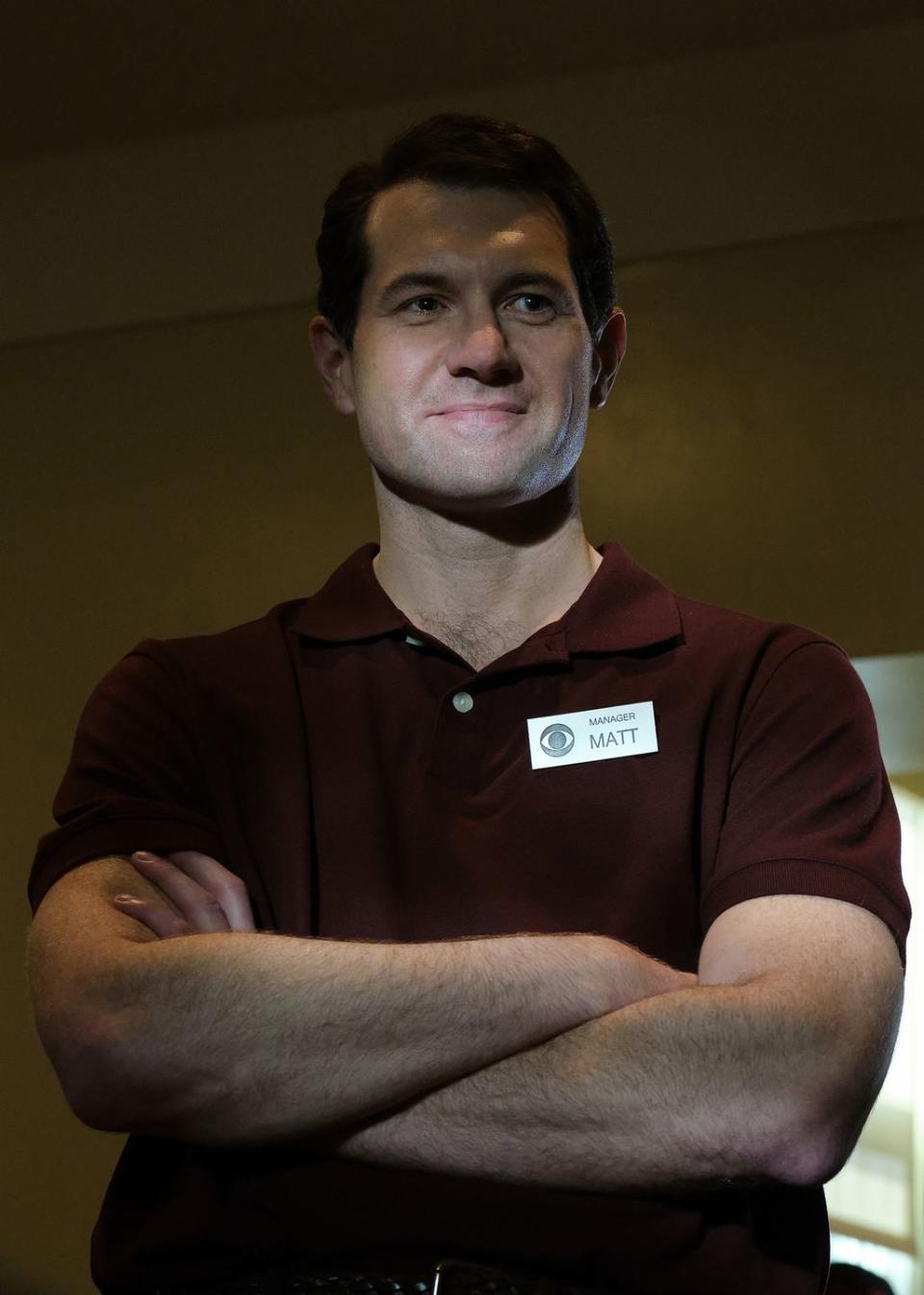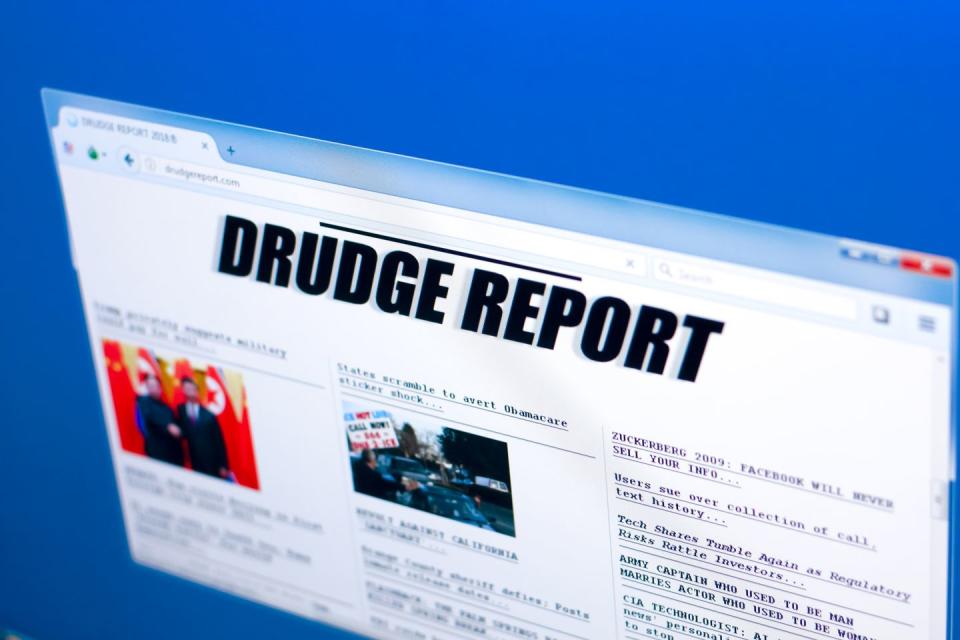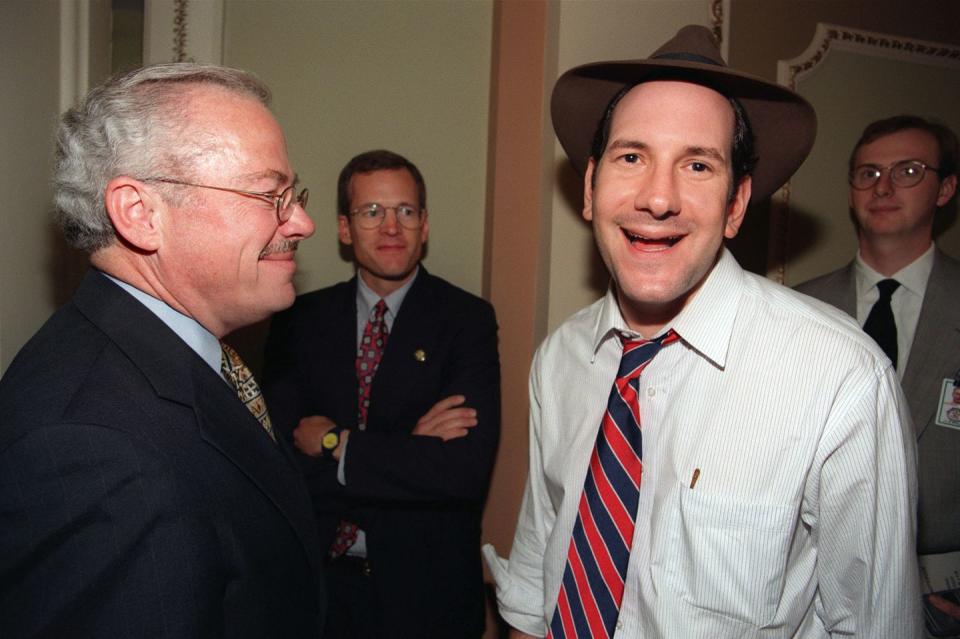The Improbable Rise of Matt Drudge, the Internet's Favorite News Scoundrel
When we first come upon Impeachment: American Crime Story’s Matt Drudge (played by Billy Eichner, who's part of a cast that includes Sarah Paulson and Beanie Feldstein), he’s a know-it-all clerk working the CBS Studios’ gift shop, extolling the virtues of the late gossip columnist Walter Winchell. And Drudge himself isn’t above using Winchell-style tactics; after the CBS building empties out for the night, the aspiring journo lowers himself into a dumpster, searching for intel about company goings-on. Drudge, and his soon to be famous site Drudge Report, achieved the impossible in 1998 and stunned the world when he broke the news about President Clinton’s affair with an intern named Monica Lewinsky—a relationship that’s at the center of the new series, airing now on FX.

Revisiting the story through Ryan Murphy’s lens 23 years later, the shock of the events removed, it’s clear that this subplot to the scandal is the fact that it in many ways served as the birth of digital media. And with his site, all giant headlines and screaming sirens, Drudge created a model of what new media would become at a time when few in mainstream media saw it coming. “He was a pioneer in some ways because very early on he figured out click bait before there were clicks,” says former New York Times executive editor Jill Abramson.
How He Started

In the 1990s, internet news existed mainly only in the form of newspaper websites. Then there was Drudge’s site, which started first in 1995 as an email newsletter. “Drudge Report actually begins as a kind of gossip column on the internet. So he begins by creating all of these links,” says Claire Bond Potter, a professor of history at the New School for Social research and the author of the 2020 book Political Junkies: From Talk Radio to Twitter, How Alternative Media Hooked Us on Politics and Broke Our Democracy. “But then, what he does is he sandwiches in his own material. It’s a very simple, extremely ugly, overly chaotic design but the sweet spot that he hits is that other reporters who are on the internet will actually keep his page open all day and they’ll pick up little bits of information that might actually lead to a story.”
Drudge’s gift shop clues, which included gossip about small screen hirings and firings, helped him establish credibility and an audience. Raised outside Washington, where his mother worked on the legal staff of Senator Ted Kennedy, he began gravitating away from Hollywood scoops and towards Beltway gossip with a conservative slant. New York Times writer at large Jim Rutenberg was a reporter at the New York Daily News when Drudge Report first appeared on his radar and he later covered him at the Times. It was clear to those in the media establishment that Drudge had a singular news instinct, though many were reluctant to acknowledge it. “When Drudge had the goods, he had the goods. He had this uncanny way of getting real stuff that we were all missing,” Rutenberg says. “There was a lot of ambivalence because he was this upstart, he wasn’t from our sort of journalistic training, per se. He hadn’t done the stations of the cross of journalism, but often he was kicking our ass.”

The political elite may not have been celebrating Drudge’s work, but they were certainly reading it. “His oddly formatted, I don’t know if we want to call it a newsletter or blog or what at that point, it drew a lot of attention from kind of the same Washington group of politicians and media people that Politicodoes now,” Abramson says. What Rutenberg quickly gleaned was that once Drudge Report’s political lean became clear, Republican staffers clamored to tip him off, helping his star rise further. “If you wanted to inject your stuff into the blood stream, you took it to Drudge. He had a line of really good sources outside his door and a very long line, at that,” he says. But his scoops weren’t all gifts. Rutenberg recalls him having a mysterious ability to divine which stories the Times would be covering, down to what would appear on the front page. Was it a mole at the paper? “I never knew. Maybe I never will. He had his ways of burrowing in.”
The Lewinsky Mystery

On January 17, 1998, Drudge Report featured an explosive headline: Newsweek had killed a story alleging President Clinton had had an affair with an intern. It had all the makings of a quintessential Drudge story, highlighting Democratic hypocrisy and the media’s aiding of it.
A day later, he published Lewinsky’s name. As we see in Impeachment, the young woman’s life is transformed in an instant.
How did Drudge end up with the scoop that transformed his career? It remains unclear. “The big question has never been answered because Drudge has never said is who gave him the story. Was it the Newsweek reporter, was it Lucianne Goldberg [a literary agent and Drudge friend who was working with Linda Trip on a tell-all], was it Linda Tripp herself? We don’t know. Did it pass through multiple hands? Nobody has ever confirmed who gave him the story, much less Matt,” says Potter. But while the who of the scoop remains a mystery, the why, at least for Potter, is perfectly clear.
“There was really only one place to go. A story that everybody at Newsweek has said, ‘we’re not going to be responsible for taking down the president,’ nobody else is going to publish either. Where else is it going to go? That’s Matt. Everything Matt Drudge has done up to that point to create a network of mainstream media people who will listen to him and everything that he’s done to show people that he’s not part of the Beltway crowd, that he has access to them but he is not one of them, makes him the go to person for the story.”
Why He Mattered

Drudge may have been underestimated early on, but media insiders today are quick to credit the immense role he played in shaping the news culture of today. “He just has the best news judgement of any one and he understands these basic rules of the tabloid journalists of the ‘20s and then more recently in Great Britain: big headlines, big pictures, animals, weather. He had this sensibility. He’s like Facebook and Twitter as if they had a curator,” Rutenberg says. “If he had gone the straight and narrow, with real journalistic training and if he took some of those lessons seriously, his news judgement would have made him one of the best news editors that ever lived.”
Potter believes it was Drudge who blazed the trail for journalism’s move online. “Journalists know that this thing that they’ve been doing, this gradual move onto electronic machines which basically starts in the newsroom as a new way of just moving your copy around the building and it then shifts into a new way for readers to access what you write, that the internet is more than an electronic platform for journalism,” she says. “It’s going to be something that changes what counts as journalism forever and they know that Matt Drudge has been the leading edge of that.”
With its controversies, sourcing questions and partisanship, many see Drudge Reportas the forefather of the information wars. An early employee of the site was the late Andrew Breitbart, whose Breitbart News has been called the platform for the alt-right. “What it does pave the way for is a wave of the amateur onto the internet and the rise of the amateur as a purveyor of news and the shift of responsibility away from the institution of publishing and towards the reader,” explains Potter. “I think that’s the major ethical shift that paves the way for disinformation. And I’m not just talking about these troll farms and so on and so forth but something like Breitbart. Breitbart’s genius is to take things that a certain mass audiences believes are true and puts them on the internet as if they are and that is really a much smaller step beyond Drudge than anybody has thought it was.”
While many describe Drudge as being fueled by his disdain for the mainstream media, there’s certainly an argument to be made that the fascination goes in both directions. He famously denies nearly all interview requests, which inspired a 2007 New York magazine piece focused on the impossible task of tracking him down. While journalists may have harbored disdain for his practices, they were also eager to have their stories linked on the site, which for a time beat out The New York Times website for readers. For many readers outside the industry, Drudge represented an alternative to the media and political establishment that so many resented – fueling their outrage with stories about President Obama’s birth certificate.
Where Is He Now?

While he cultivates a reclusive image, Drudge runs in tony conservative circles with friends like the late Rush Limbaugh and Ann Coulter. But his willingness to question Trump has led to backlash from hardline MAGA supports. (In a recent piece for Vanity Fair, Joe Hagan recently reported having received a text from Ann Coulter saying, “Drudge and I are both leaving Florida and we’re not telling anyone where we’re going this time.”)
“He’s taken some hits because as a curator he finally hit his limit with Trump, which was very fascinating. He’s not willing to get the audience what it wants—which is complete fantasy… he does have some limit. I would imagine what OAN does and certainly the sub-Reddit talk groups do is beyond where he would ever want to go,” says Rutenberg. “Every single major media figure on the right somehow feels alienated from the establishment and driven to tweak or undermine it. This goes so far beyond that. He’s not someone who wants to promote hate speech.”
One thing is clear to Rutenberg – however Drudge’s influence may have waned, his legacy hasn’t. “Whatever happens to Drudge tomorrow, there’s no giving away the effect he had. We’re very much, to some degree, living in his world.”
You Might Also Like


